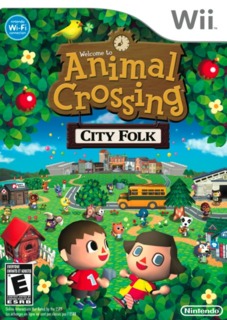'City Folk' is as addictive as you'd expect an Animal Crossing game to be, but about as shallow as its predecessors.
Unfortunately, that's a resounding "no". Does City Folk have a lot more features than its previous console installment? Heck yes. More than Wild World? Debatable. City Folk does expand upon the online aspect of the game, but not by much. The voice chat addition to the game certainly is nothing to brag about, nor is the continuation of the mandatory friend code system. And as far as the single player experience goes, the new city aspect of the game is poorly implemented, and can be completely avoided in the end. It serves no purpose other than a space filler.... which is a real shame, given that the idea of an expansive city in an Animal Crossing title is very intriguing.
But of course, that isn't to say that City Folk is an awful game. If you were addicted to the fossil-collecting, bug-catching, fishing, Tom Nook hating madness of the past two games, you'll certainly love this one just as much. You have plenty of items to collect and furnish your house with (probably the highlight of the game), many quirky animal neighbors to chat with, and an online feature that will, at the very least, add some replayability to the game (though Animal Crossing isn't really one of those games that ends anyway...). It's a genuine pleasure to play through, and gives that nostalgic feeling of being a five-year-old all over again.
Graphically, the game is.... well, stuck in the past. Its' visuals are certainly above and beyond the Gamecube title's graphics, as well as the DS version's, but not by much. It can easily be compared to that of the DS game's, especially since the layout of both games are nearly identical. Then again, who really plays an Animal Crossing game for its epic graphical polish and detail, anyway?
What the game lacks in visuals, it makes up for in audio. It may not have the masterful score of a Zelda or Mario game, but it does feature a medley of both, in addition to its own catchy theme and background music. As usual, the animal jargon of your neighbors will quickly get on your nerves, but that's typically about the time you smack them with your shovel or bug net.
Obviously, if you're looking for a hardcore experience here, you'll be severely disappointed. But if you're looking for a more nonchalant take on gaming and its offerings, then you'll be more than satisfied with City Folk. It offers enough depth in multiplayer (which is mostly left up to your own creative imagination) and customization features to keep you occupied for months on end. The same cannot be said for many games of the same genre, and no other simulation game offers the charm and wit of Animal Crossing. It would be a bit of an exaggeration to put it in the same league as something like The Sims, but through the years Animal Crossing has created its own sort of genre. The kind of genre that keeps you hooked for months, though you can never figure out why. In the end, its your own wild imagination and outlook on the game that keeps you interested. You'll never be overly interested in what your annoying animal neighbors have to say, or what Tom Nook thinks of your spending habits, but your imagination will never keep you from enjoying the game. And, if imagination isn't enough, then the multiplayer supplies you with sufficient satisfaction, enough to satiate your own desire to show off your latest take on your house or town.
City Folk may suck as a metropolis, but it succeeds as an intense and addictive form of entertainment.

